Literature & Poetry
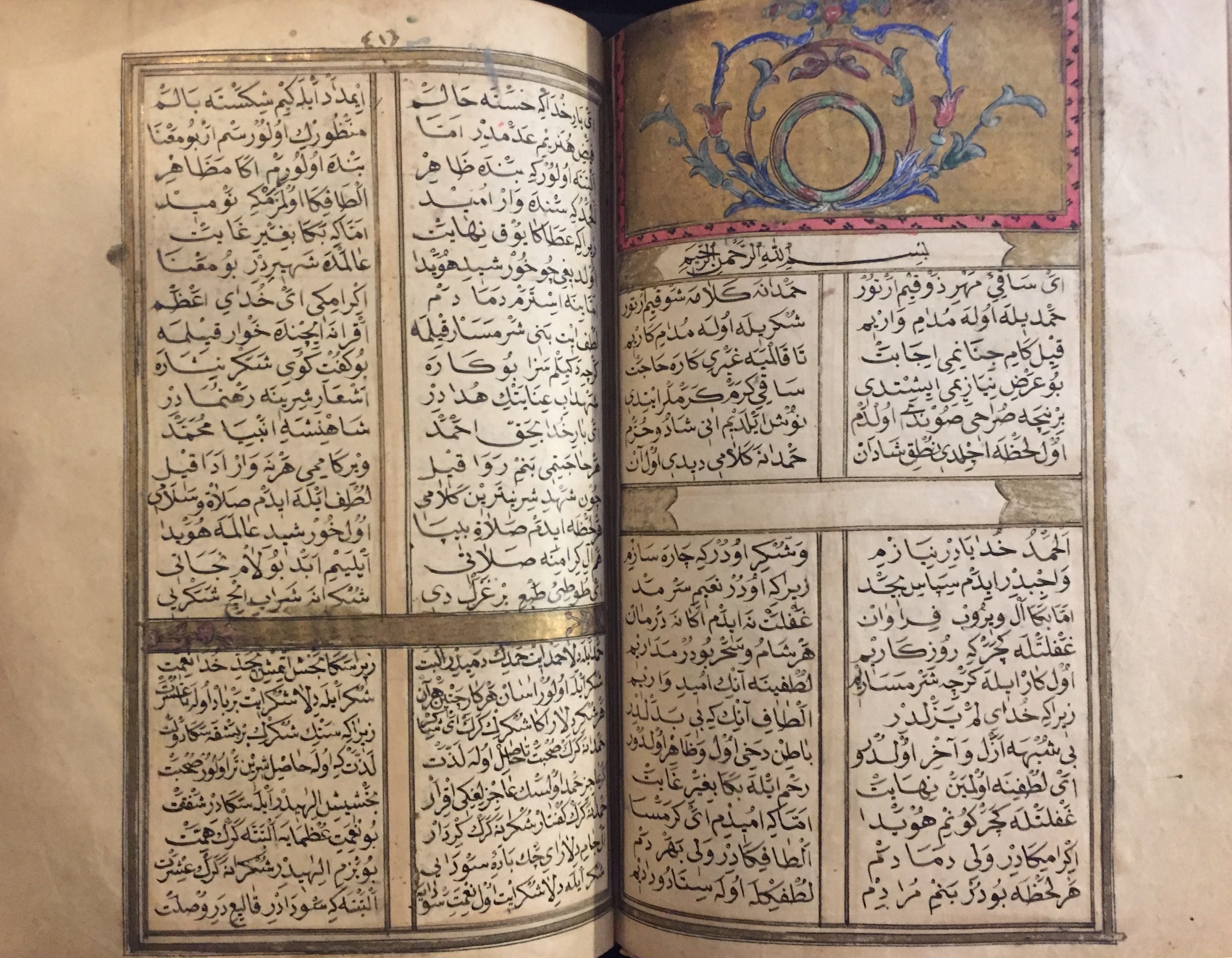
Seyyed Mir Hamza Nigârî, ( 1219 – 1313 H. / 1805 – 1896 AD)
The Complete Works
Manuscripts and Printed Parts in Ottoman Turkish.
Bound in one volume:
1. Dibace/preface, manuscript, 2 pp.
2. Silsila, manuscript, 1 p.
3. Divân-ı Seyyid Nigâri Be-Zeban-ı Türkî and Çaynâme, Istanbul 1302 [1886], Süleyman Efendi Matbaası 366 pp. (with handwritten additions of parts not printed)
4. Nigarnâme, manuscript, author’s copy, 187 pp.
5. Menâkıb-ı Seyyid Nigârî, manuscript, 10 pp.
Mir Hamza Nigari is the most famous mystic in Anatolia and Caucasia in the 19th century. Nigari was born in the town of Zengezur in the Caucasian region of Karaba and received his primary education there. While still young, he moved to Anatolia and joined the smail irvani sect in Amasya. Nigari, who taught mystical principles in Istanbul, Erzurum and Harput, died in Harput and is buried in Amasya. ad 2: Silsila in Sufism is the spiritual chain of a sheikh that connects him to the Prophet Muhammad through previous generations...
more »
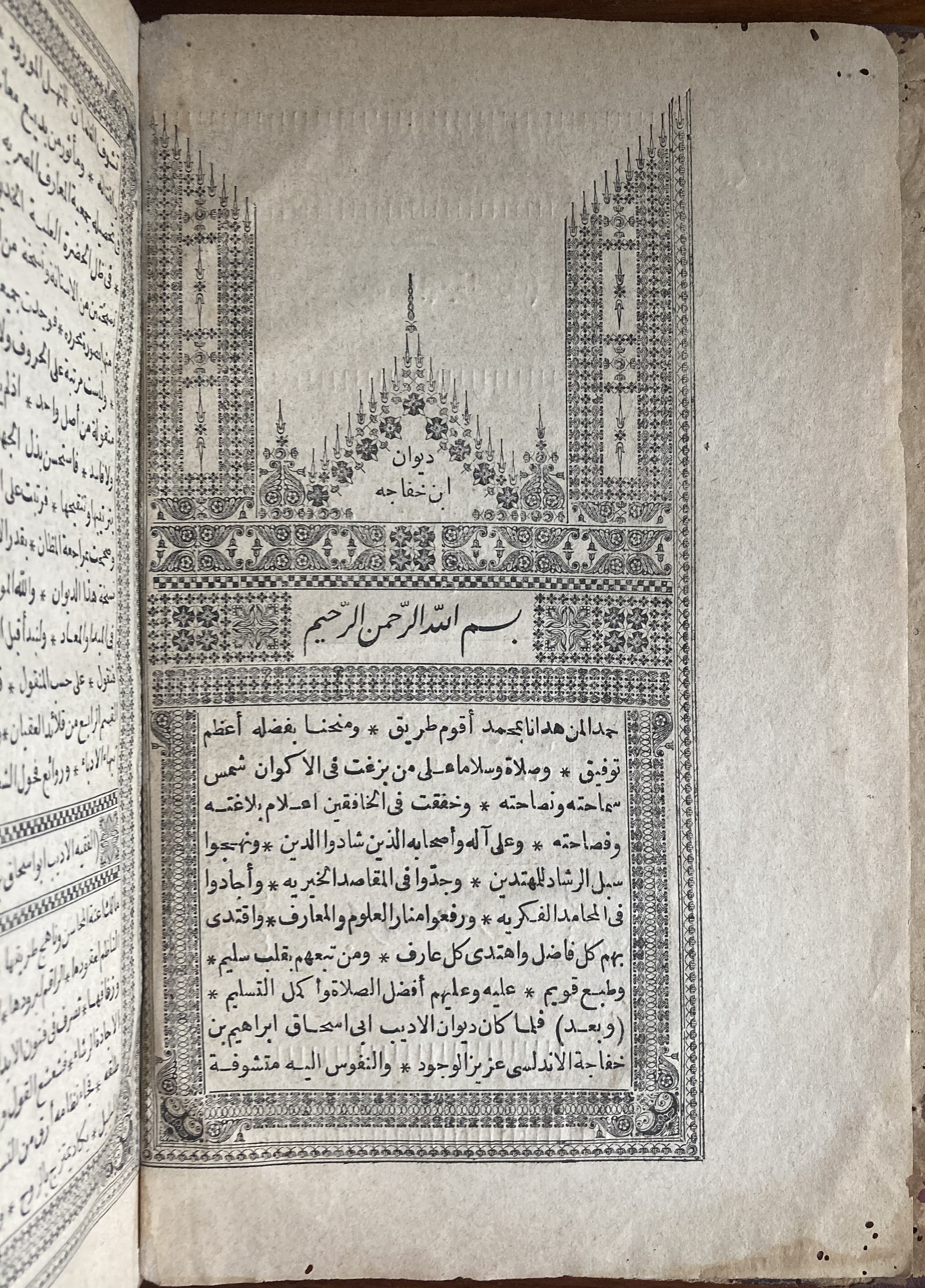
[Ibn Khafāja], Abū Isḥāq Ibrāhīm Ibn Khafāja al-Andalusī
Dīwān
Printed in Arabic
Cairo: al-Maṭbaʿa al-khāṣṣa bi-jamʿīyat al-maʿārif, ghāyat Rabīʿ al-Awwal 1286 h., 135pp., Contemporary binding.
...
more »
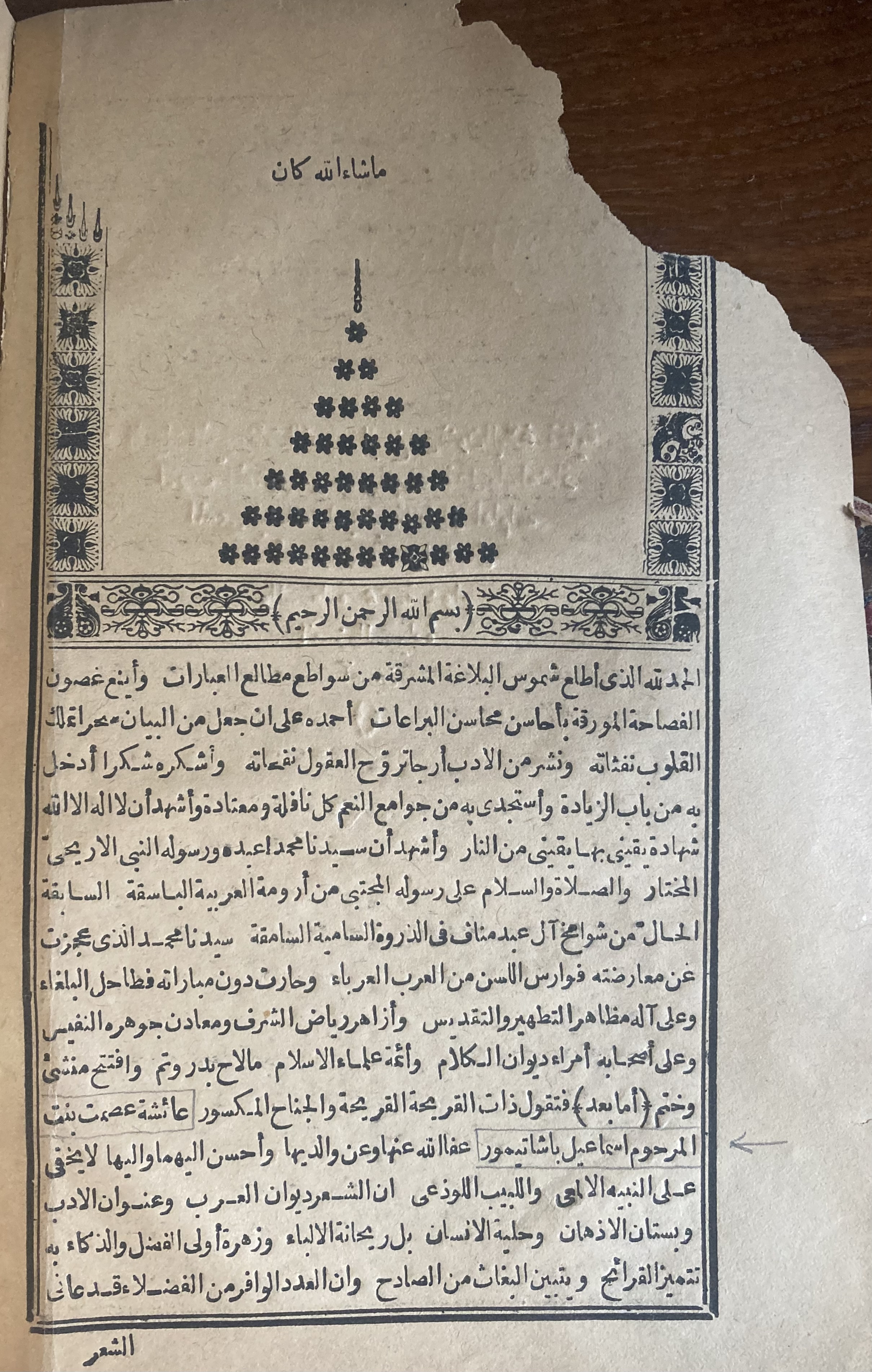
Aisha ʿIṣmat bint Ismāʿīl Pasha Taymūr
Dīwān Ḥilyat al-ṭirāz
Printed in Arabic
Cairo: al-Matbaʿa al-ʿāmira al-sharīfa, 1303 h., 72pp.
Women's literature and Egyptian nationalism,
cf. the publication of: Mervat F. Hatem, Literature, Gender, and Nation-Building in Nineteenth-Century Egypt, pp. 151-194 [chapter Hilyat al-Tiraz, Hybridity, the Intersection of the Old and the New, and Private and Public Struggles] (according to article published in 1892).
Contemporary binding. Book block and binding damaged. Of interest for research on literature and history in the 19th century.
GAL II 475, S II 7
...
more »
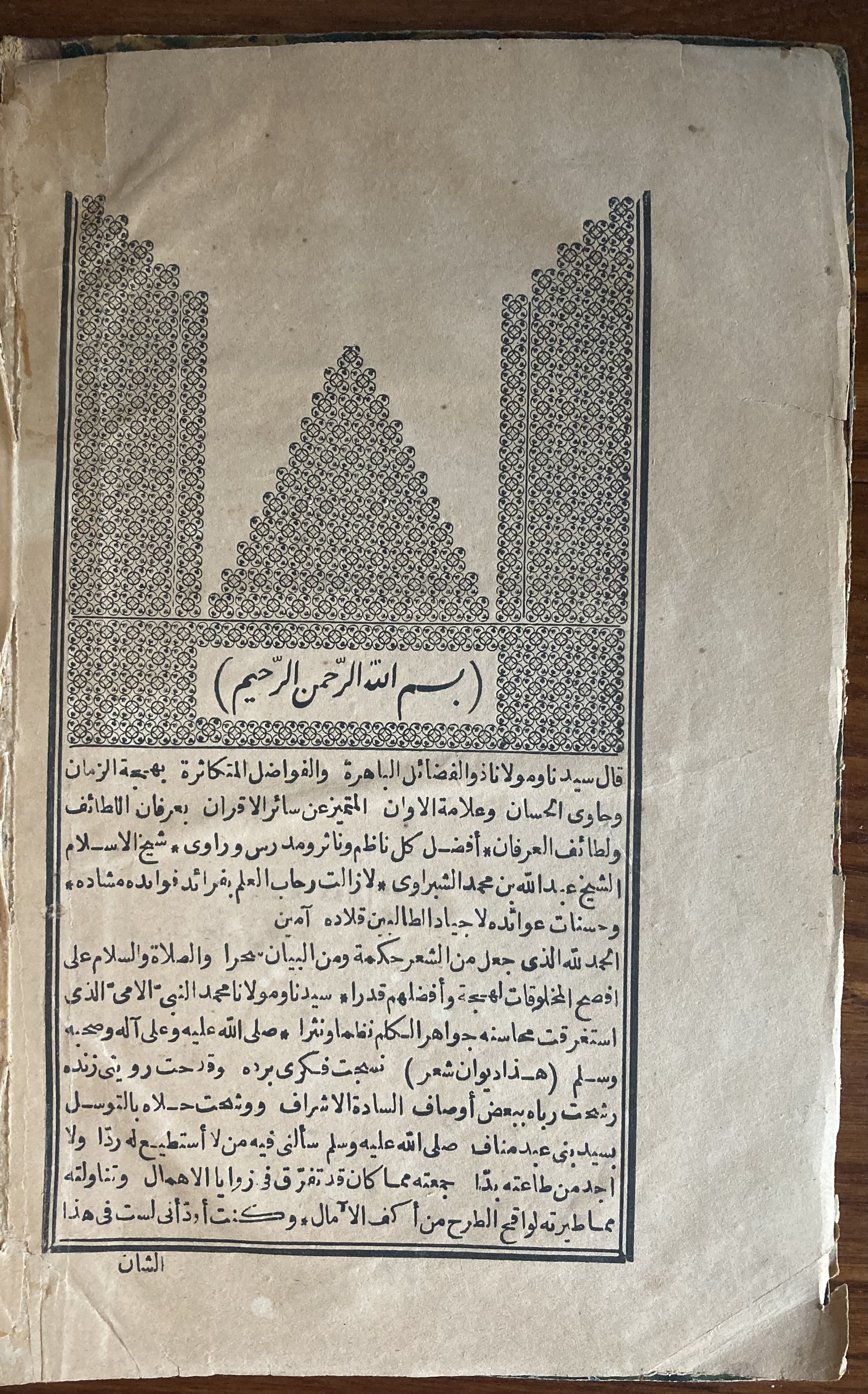
ʿAbd Allāh Muḥammad Al-Shabrāwī
Dīwān
Printed in Arabic
Cairo al-Maṭbaʿa al-Kāstalīya 1293 h., 88pp.
Loose contemporary binding
Author from the mid-18th century.
Khaled Rouayheb, Before Homosexuality in the Arab World (1500-1800), refers to the author several times.
GAL II 281, S II 288, 390
...
more »
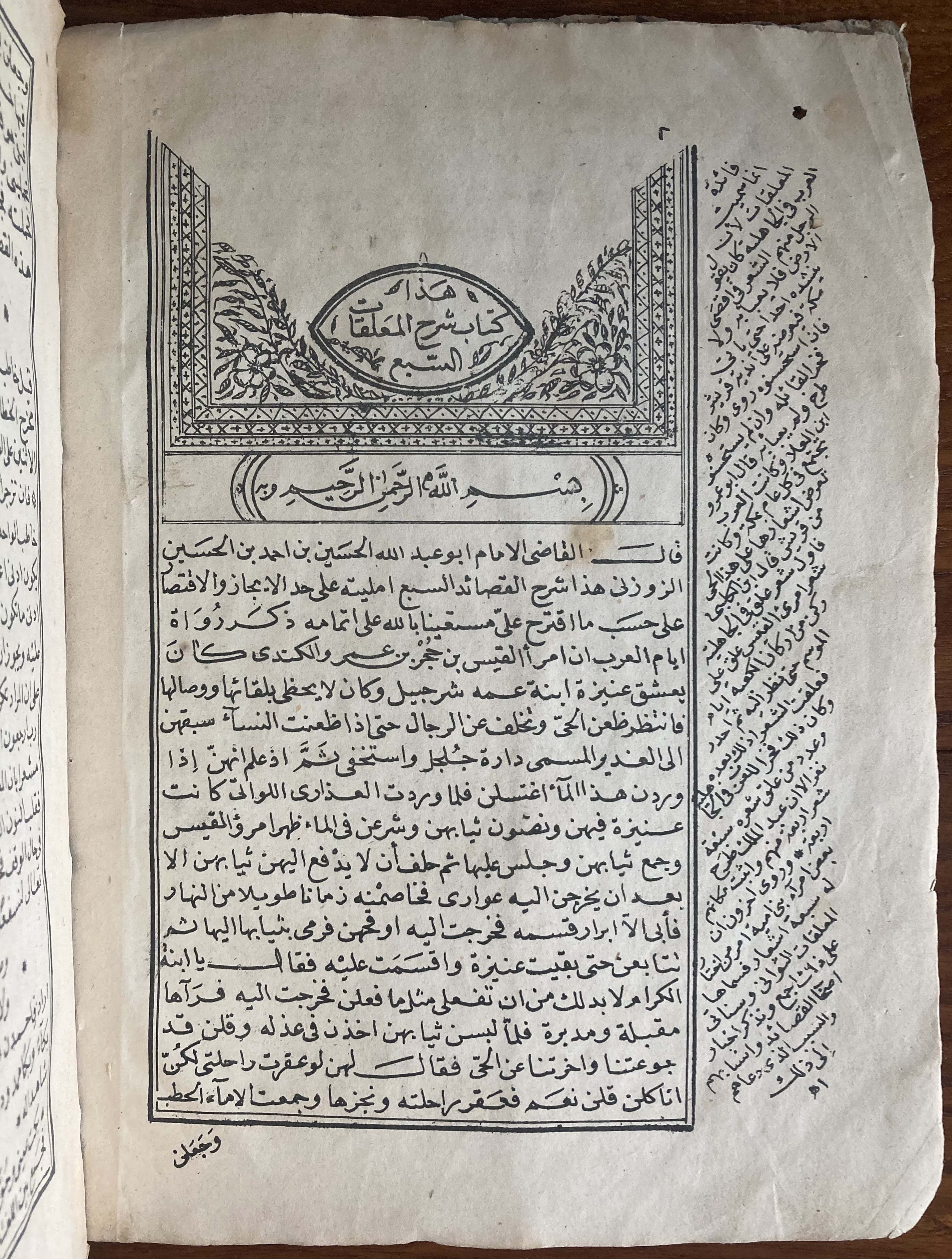
[al-Zawzanī], Abū ʿAbd Allāh al-Ḥusayn ibn Aḥmad ibn al-Ḥusayn al-Zawzanī
Sharḥ al-muʿallaqāt al-sabʿa
Printed in Arabic
[Cairo ?]: Maṭbaʿa al-ḥajar al-bāhira, Rabī al-āḫar 1277 h., 187pp.
Contemporary Binding, lithographic printing.
On page 1 recto, under the title, is a short biography of the author. According to the colophon commissioned by (muḥibb intishār al-ʿulūm al-nāfiʿa li-jamīʿ al-ʿibād) al-Ḥāfiẓ Efendi ʿAbd al-Raḥmān.
...
more »
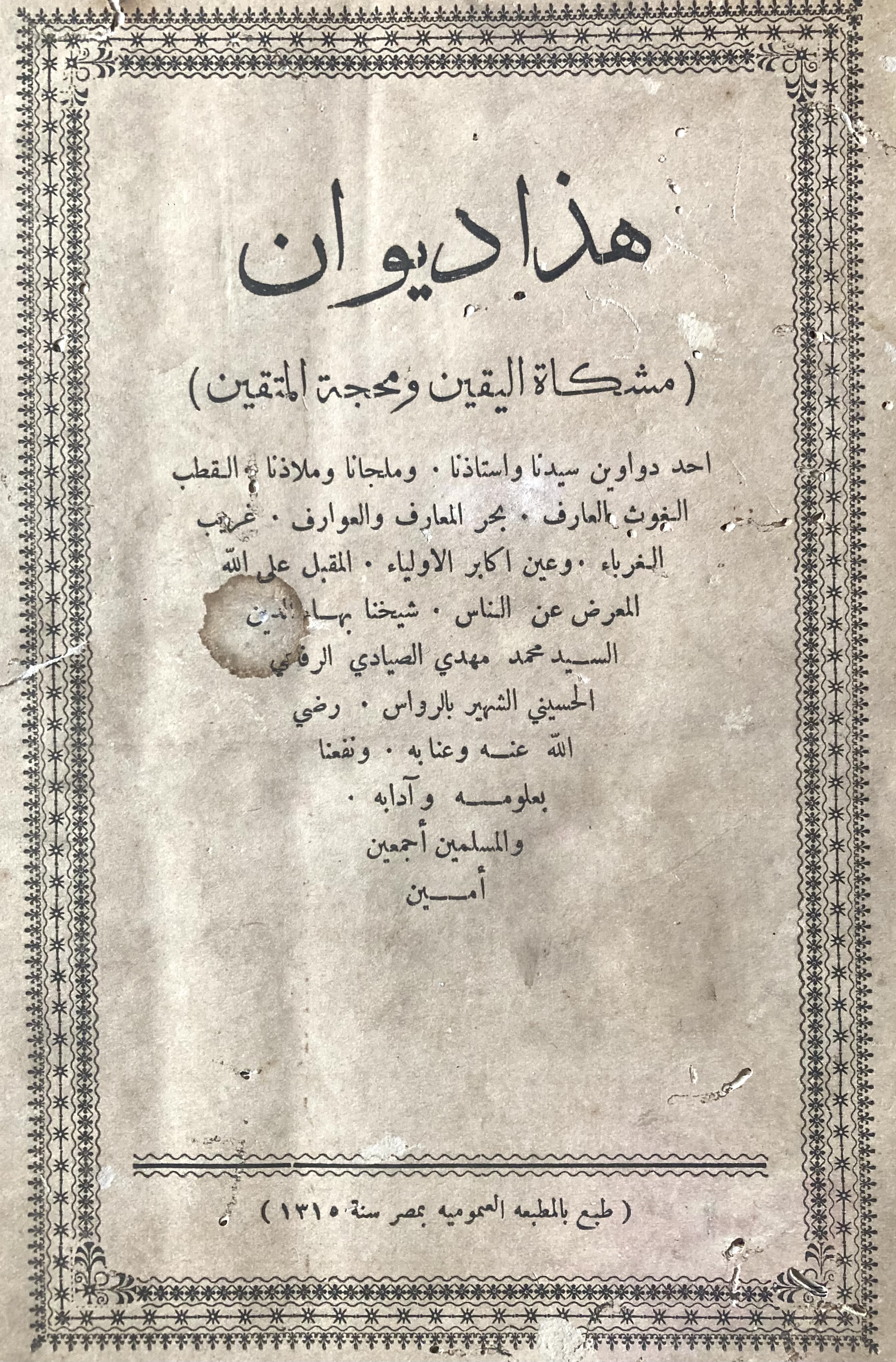
Bahāʾ al-Dīn al-Sayyid Muḥammad Mahdī al-Ṣayyādī al-Rifāʿī al-Ḥusaynī [al-shahīr bi-] al-Rawās
Dīwān mishkāt al-yāqīn wa-muḥabbat al-muttaqiyīn
Printed in Arabic
Cairo: al-Maṭbaʿa al-ʿUmūmīya 1315 h. 402 pp.
Dīwān of a Rifāʿīya sheikh, eponym of a sub-order of the Rifāʿīya. Born in Basra 1805.
Worm wholes on several pages, including cover.
...
more »
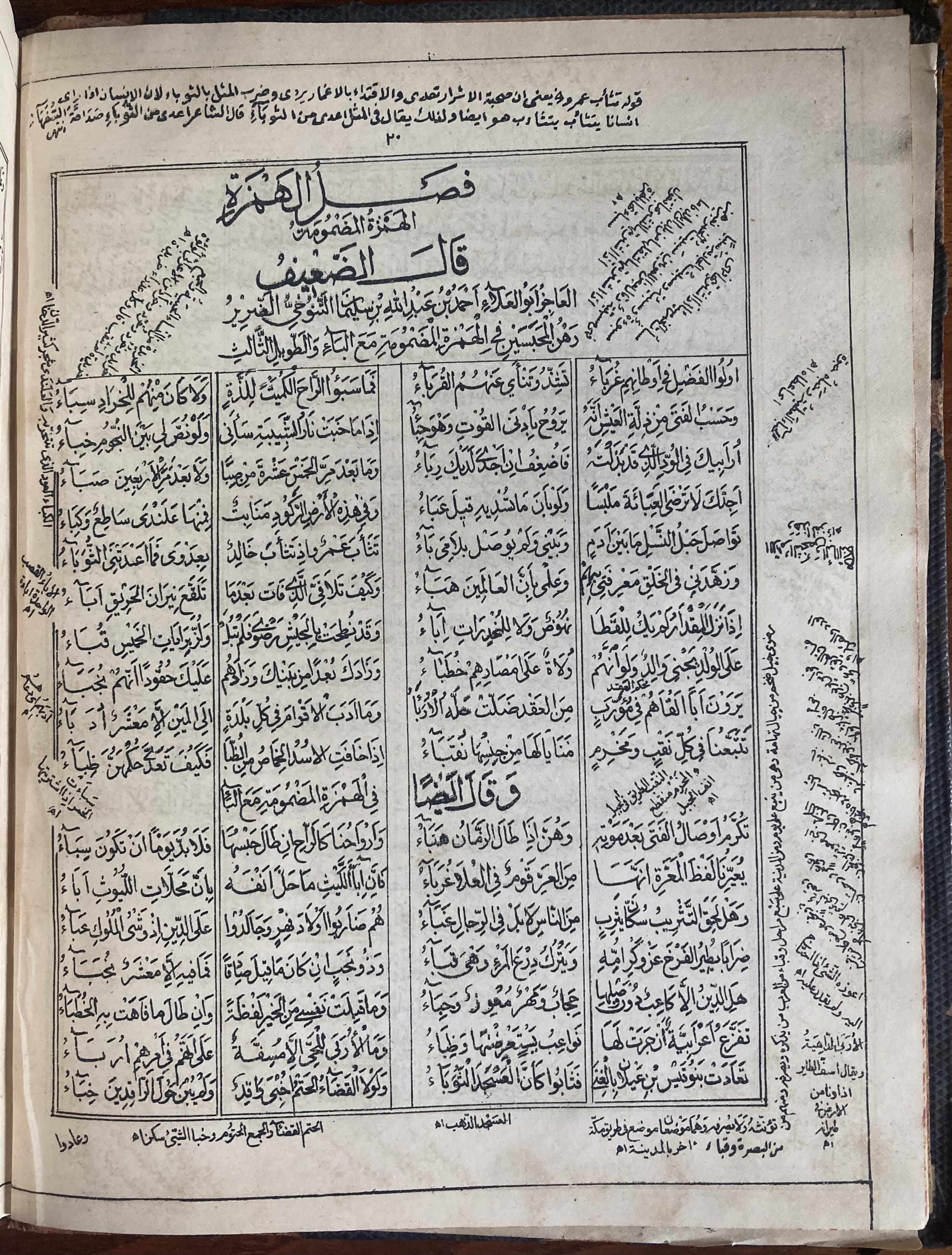
[Al-Maʿarrī], Abū l-ʿAlāʾ al-Maʿarrī al-Tanūḥī
Dīwān Ḥilyat al-ṭirāz
Printed in Arabic
Mumbai: al-Maṭbaʿa al-Ḥusaynīya, Ghurra Shawwāl 1303 h. 2nd printing, Lithographic print, 348pp.
Copied by Mirzā Ḥusayn al-Bahāʾī al-Shīrāzī.
...
more »
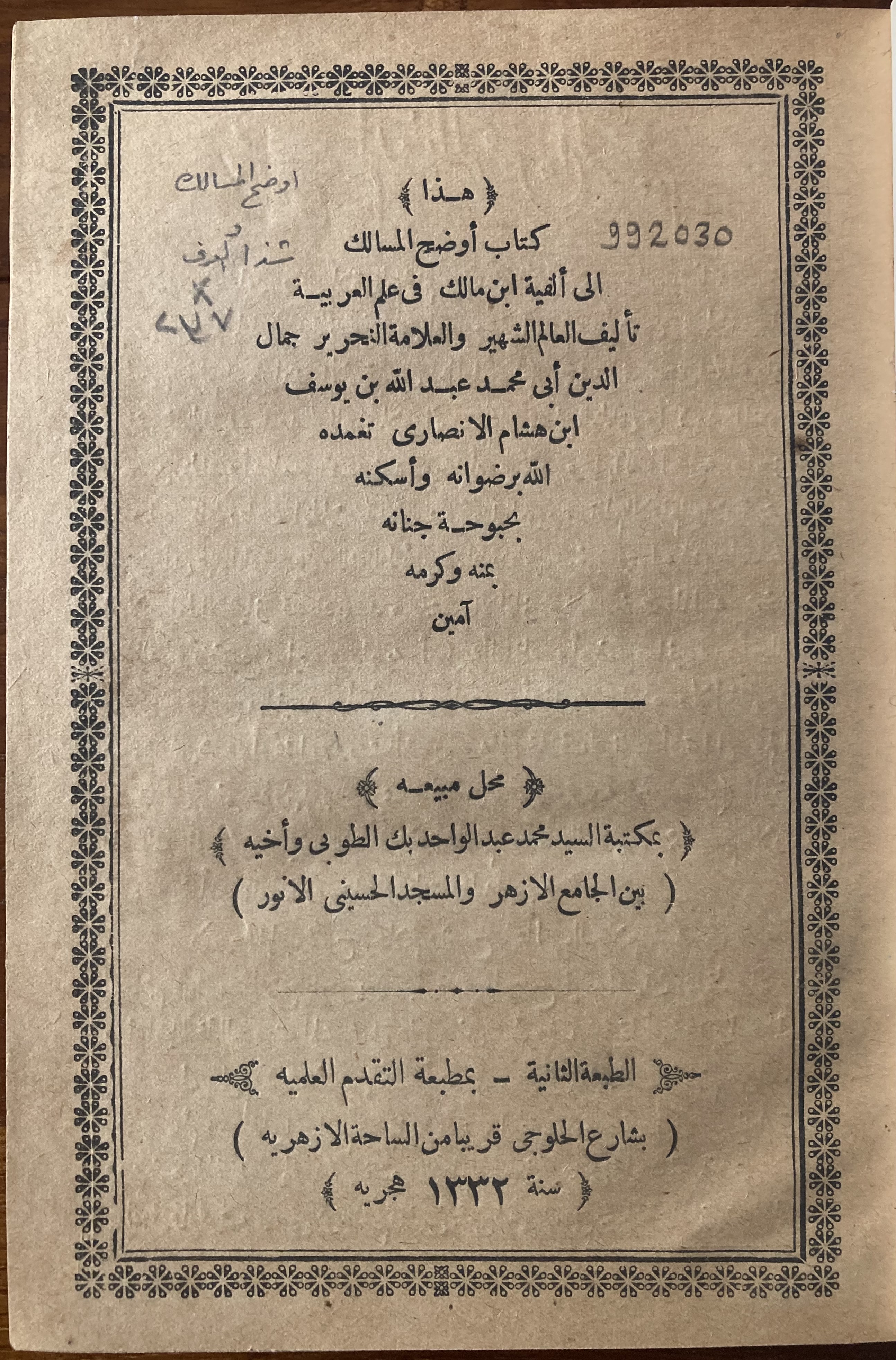
Ibn Hishām, Jamāl al-Dīn Abū Muḥammad ʿAbd Allāh ibn Yūsuf Ibn Hishām al-Anṣārī – Second author: Ḥamalāwī, Aḥmad,
Awḍaḥ al-masālik ilā alfīyat Ibn Mālik fī ʿilm al-ʿarabīy / Second book: Kitāb shidhā al-ḥarf fī fann al-ṣarf
Printed in Arabic
Cairo: Maṭbaʿa al-taqaddum al-ʿilmīya 1332 h. 192pp. (Second Edition.)
2nd book: Cairo: al-Maṭbaʿa al-Amīrīya, 1329 h., 152pp.
192pp.& 152pp.
Contemporary binding.
...
more »

Abū Muḥammad ʿAbd Allāh b. Muslim Qutayba al-Dīnawarī
Kitab Adab al-kātib
Printed in Arabic
Cairo: Maṭbaʿa al-Vaṭan al-Bahīya, Muḥarrem 1300, 229pp
Cover page missing.
A philological manual for use by secretaries by Ibn Qutayba (d. 899).
Cf. Zürich UAOI BC IV a 10
...
more »
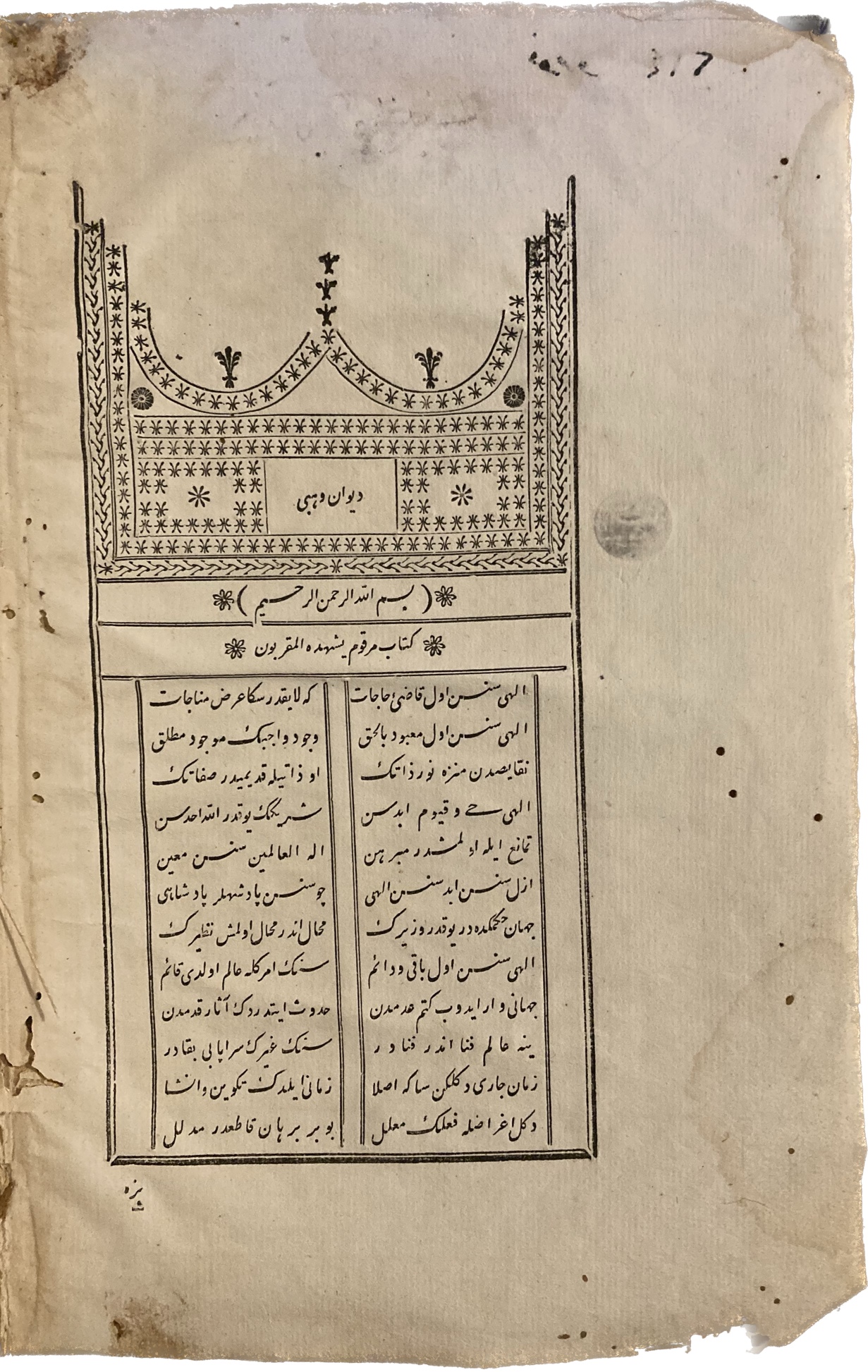
VEHBİ SÜNBÜL ZADE
Divan-ı Vehbi
Cairo : Bulaq 1253 [1837]
First and only edition. 20, 17, 43, 131, 16, 97, 61 p.
25x17 cm.
Contemporary library binding.
From the Library of Grand Vizir Sait Pasha
Özege 4242
...
more »
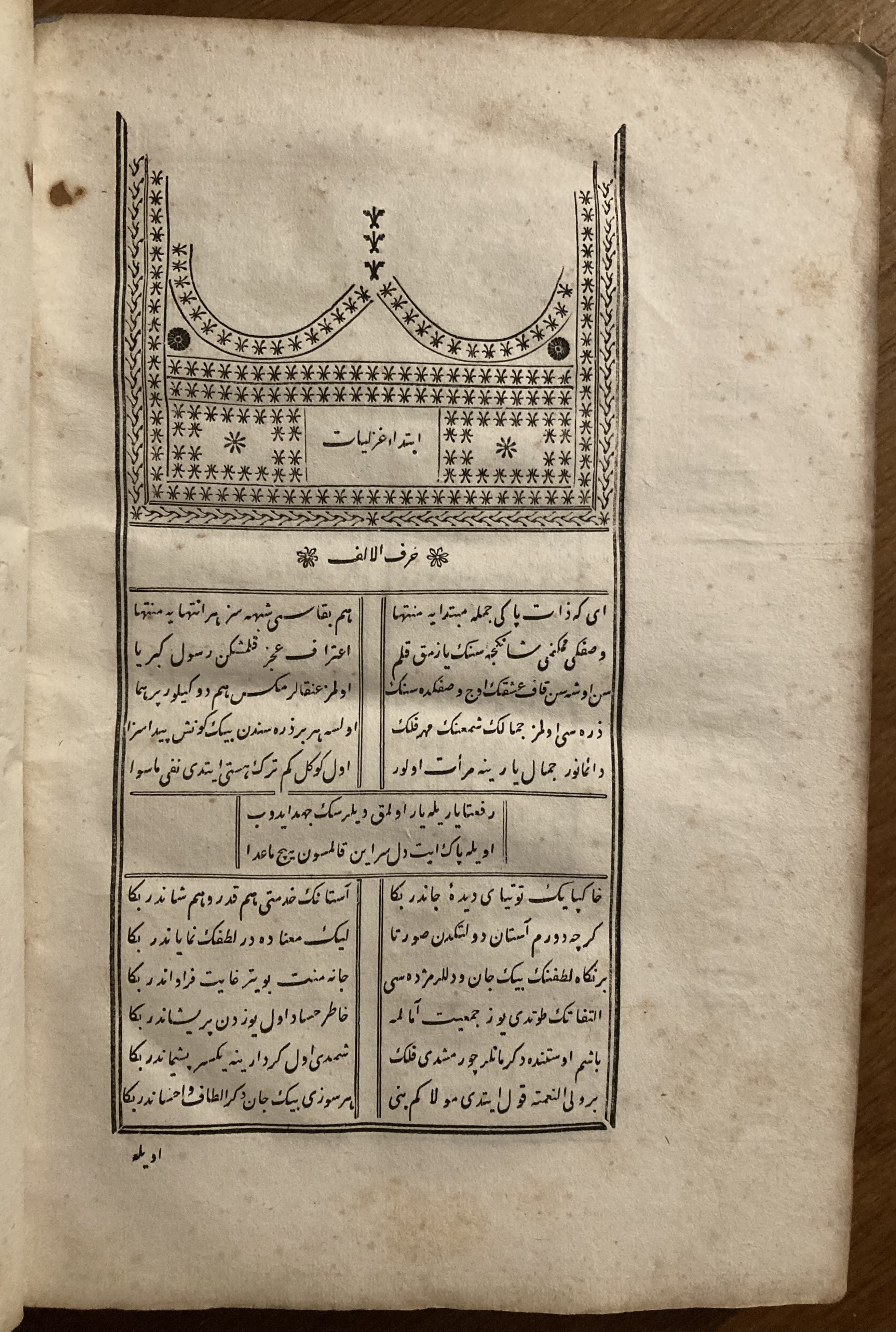
EBUBEKİR RIFAT ELHAC
Münşeat ve divan-ı Rıfat Efendi
Cairo: Bulaq 1254 H [1838 AD]
183, 52, 25 p., 23x15 cm.
Contemporary Ottoman style quarter leather bound.
Boards are cloth. With decorative stamps.
Özege 14824
...
more »
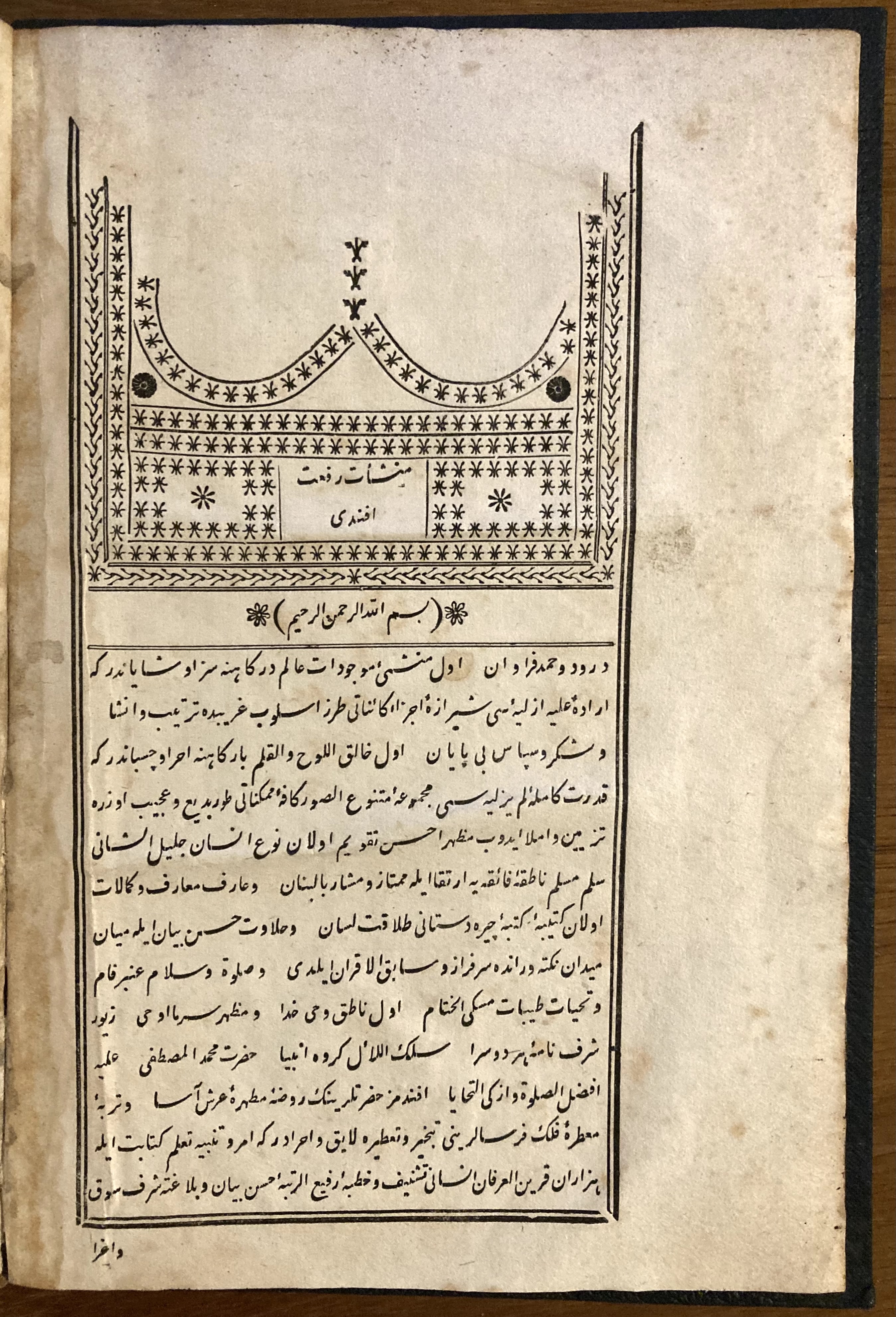
EBUBEKİR RIFAT ELHAC
Münşeat ve divan-ı Rıfat Efendi
Cairo: Bulaq 1254 H [1838 AD]
First and only edition
183, 52, 25 p., 23x15 cm.
Contemporary Ottoman style quarter leather bound.
Boards are cloth. With decorative stamps.
Marbled endpaper.
Özege 14824
...
more »
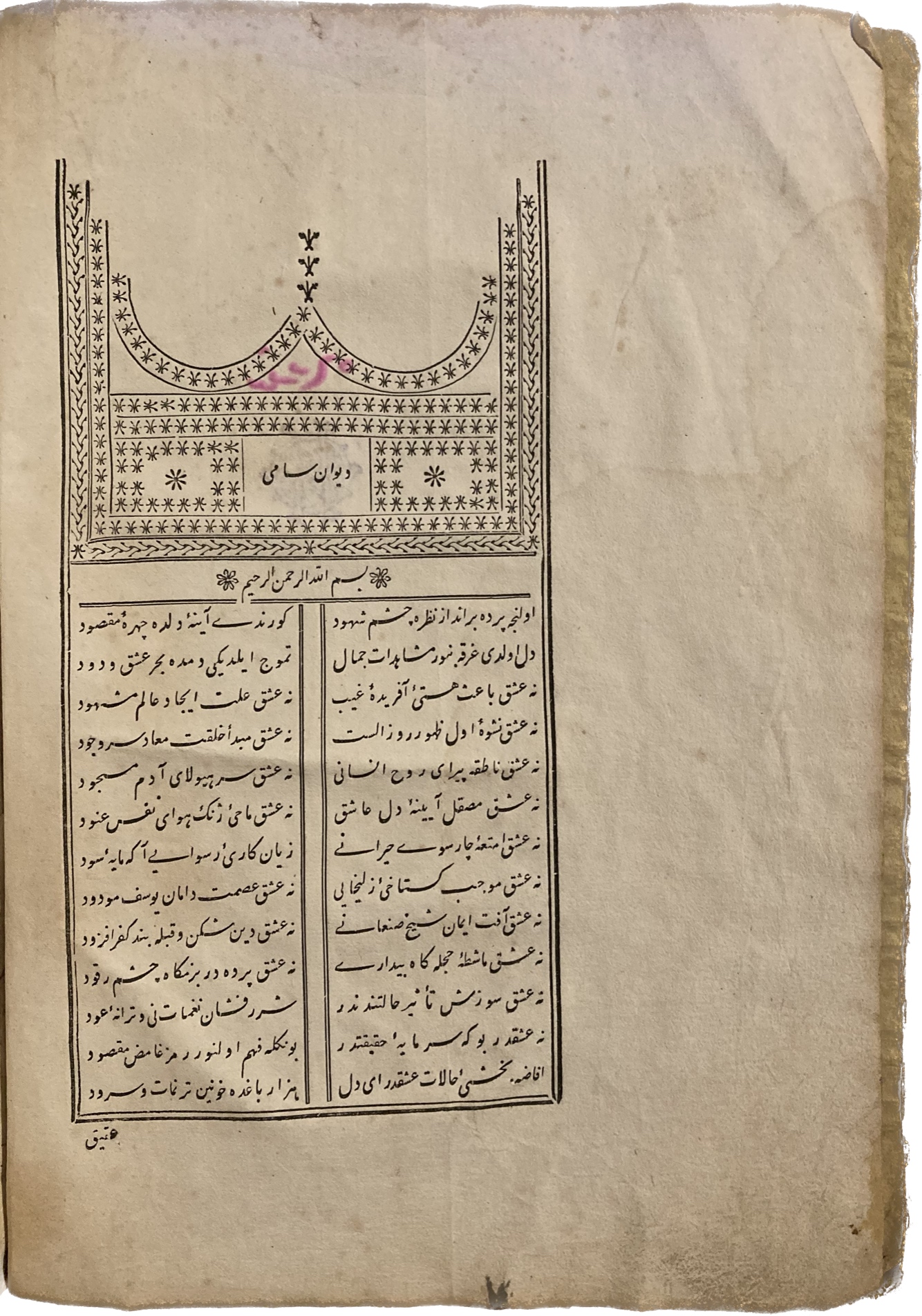
MUSTAFA SAMİ ARPAEMİNİ ZADE
Divan-ı Sami
Cairo: Bulaq, 1253 H [1837 AD]
First and only edition
104, 47, 67 p. , 25x17 cm.
Contemporary Ottoman style quarter leather bound. Boards are marbled paper.
...
more »
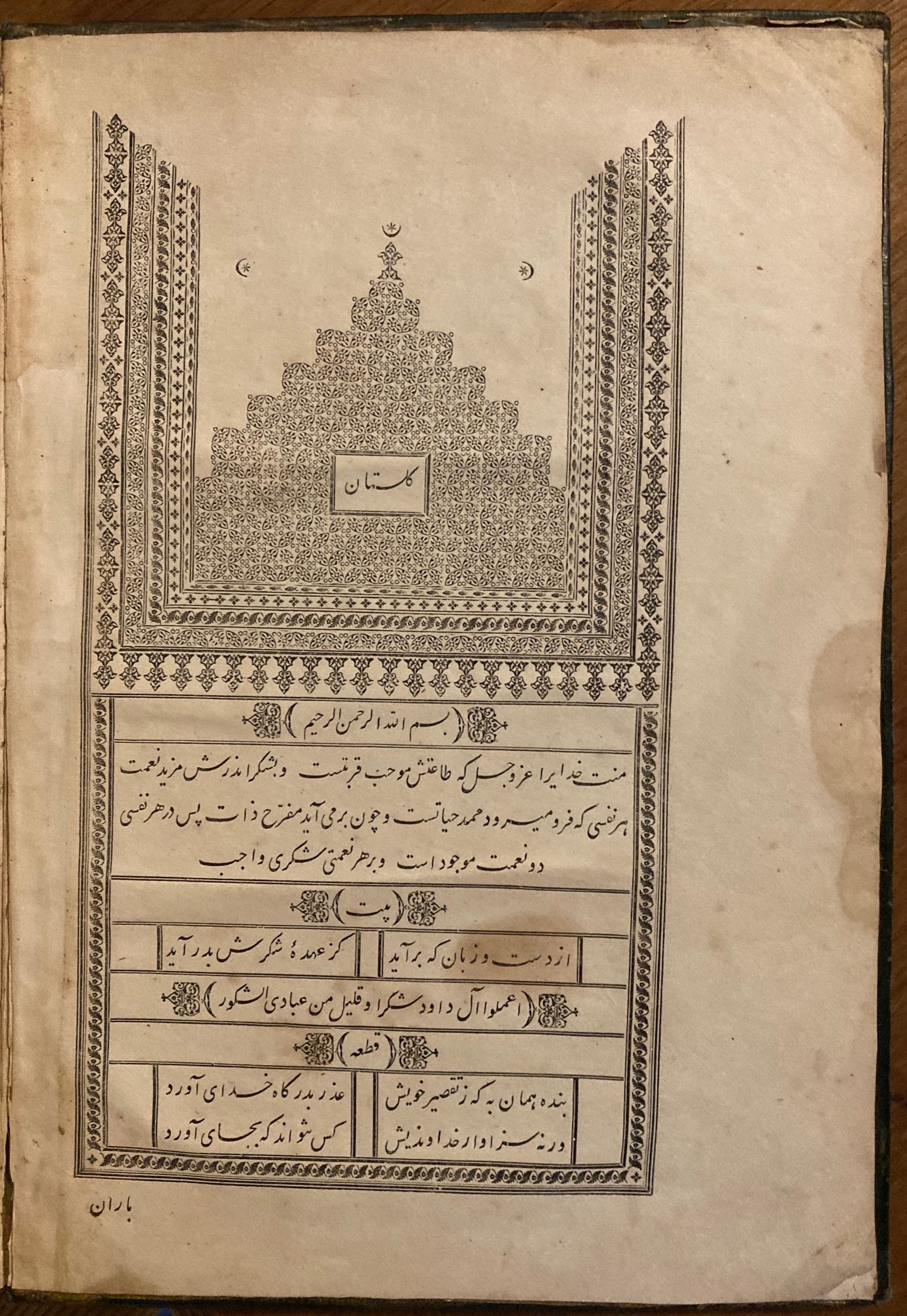
PERTEV
Divan-ı pertev
Cairo: Bulaq, 1253 H [1837 AD]
First edition
91 p. 25x17 cm. Contemporary full cloth bound.
Özege 4209
...
more »
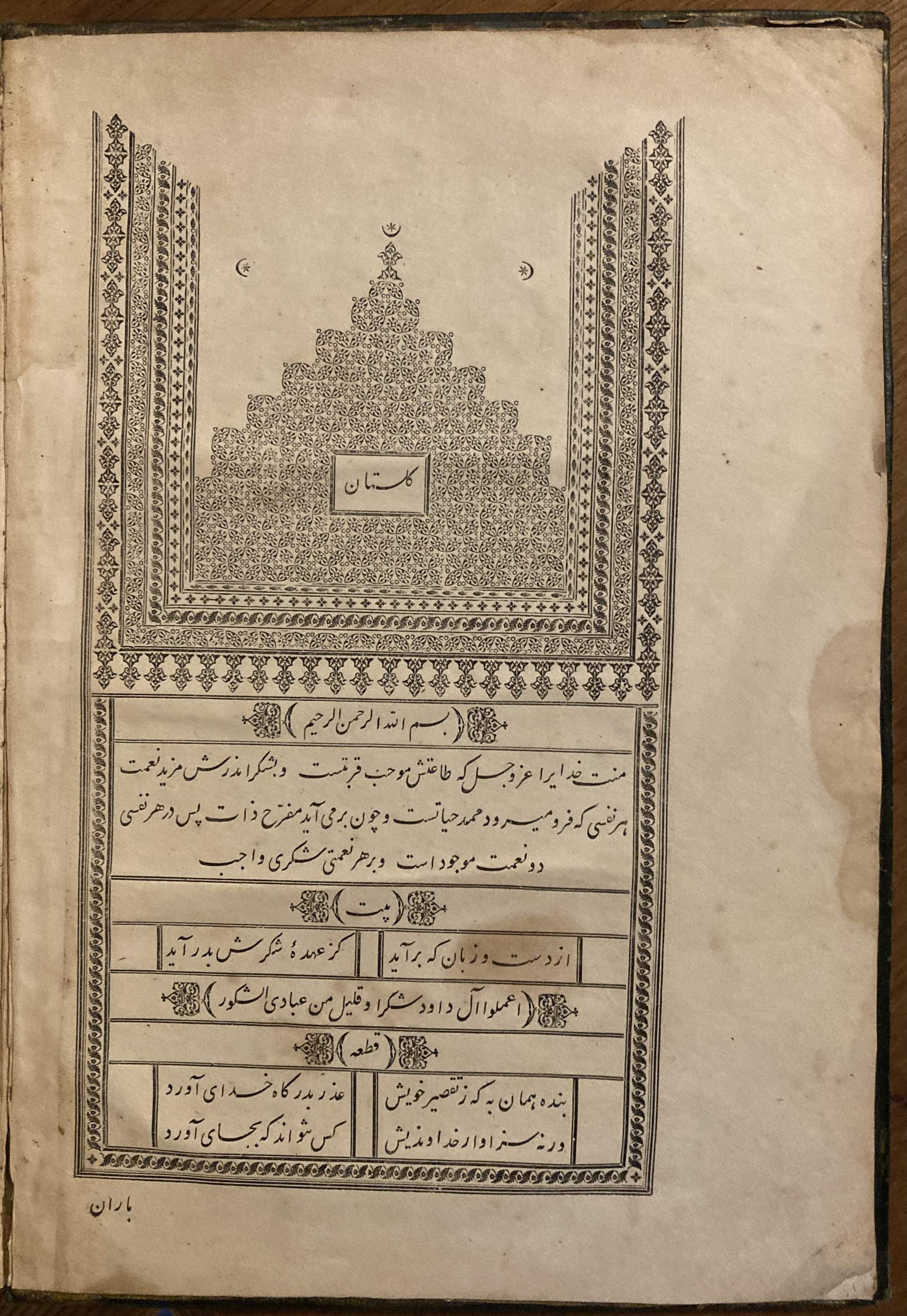
ŞEYH SADİ
Gülistan
Cairo: Bulaq, 1259 H [1843 AD]
Ottoman classical style ornamental title page and 161 p.
25x17 cm.
Contemporary Ottoman style full leather bound. Headpiece.
Decorative stamped binding. All edges gilt.
...
more »
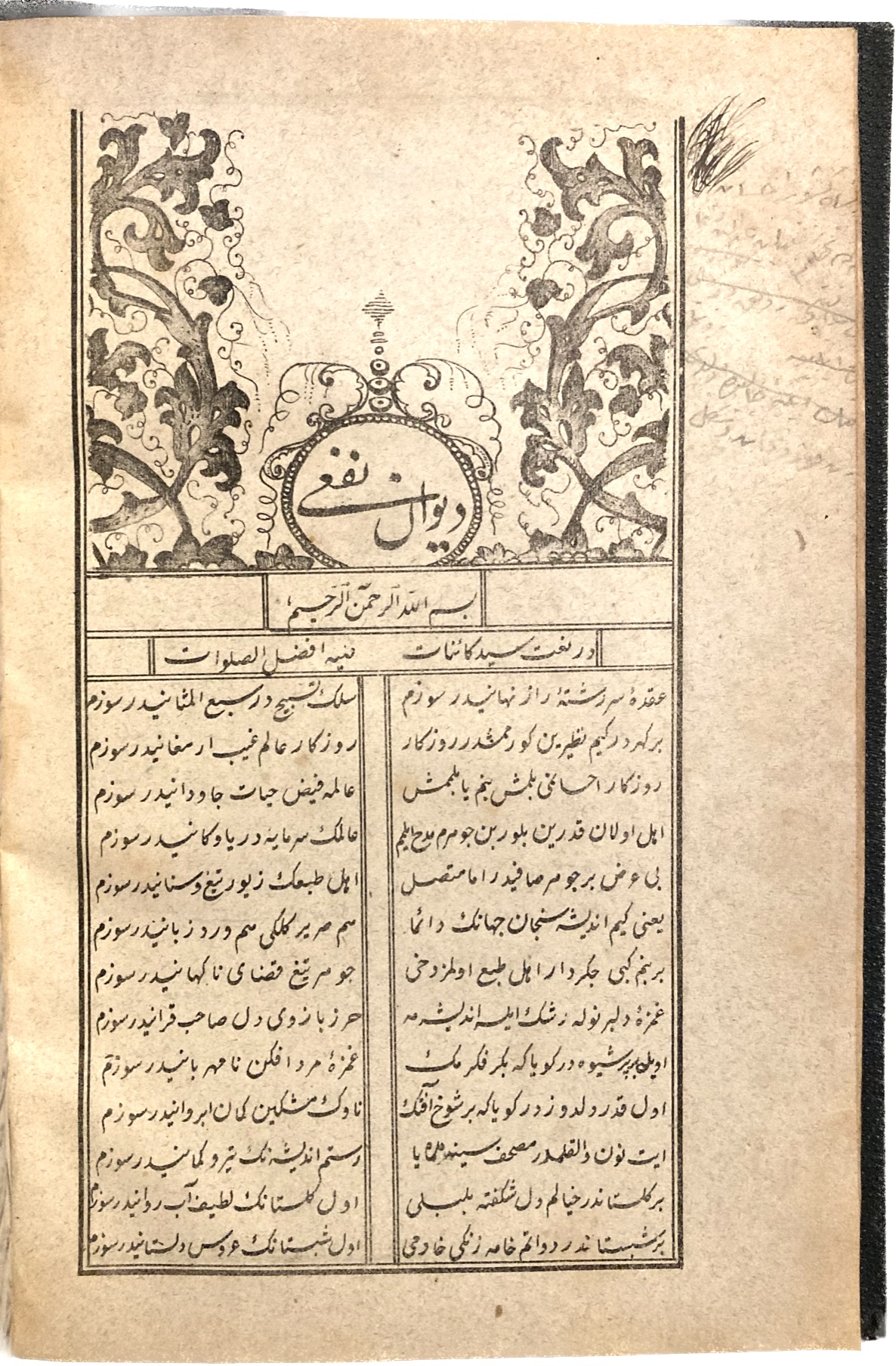
ÖMER NEF'İ
Divan-ı nef'i
Istanbul: Ceride-i Havadis Matbaası 1269 H [1853 AD]
207, 38 p. 23x15 cm
Ottoman classical style ornamental title page and Contemporary Ottoman style quarter leather bound. Boards are cloth.
Özege 4202
...
more »

SEHER ABDAL
Nan-u Helva
No place, No date
27 p. 21,5x13,5 cm
Ottoman classical style ornamental title page.
Contemporary Ottoman style hard cover. Boards are marbled paper.
A perfect example of the combination of Ottoman caligraphy and printing techniques. The letters were designed by the Caligrapher Râcih Efendi and cut by famous Ohannes Muhendisyan....
more »
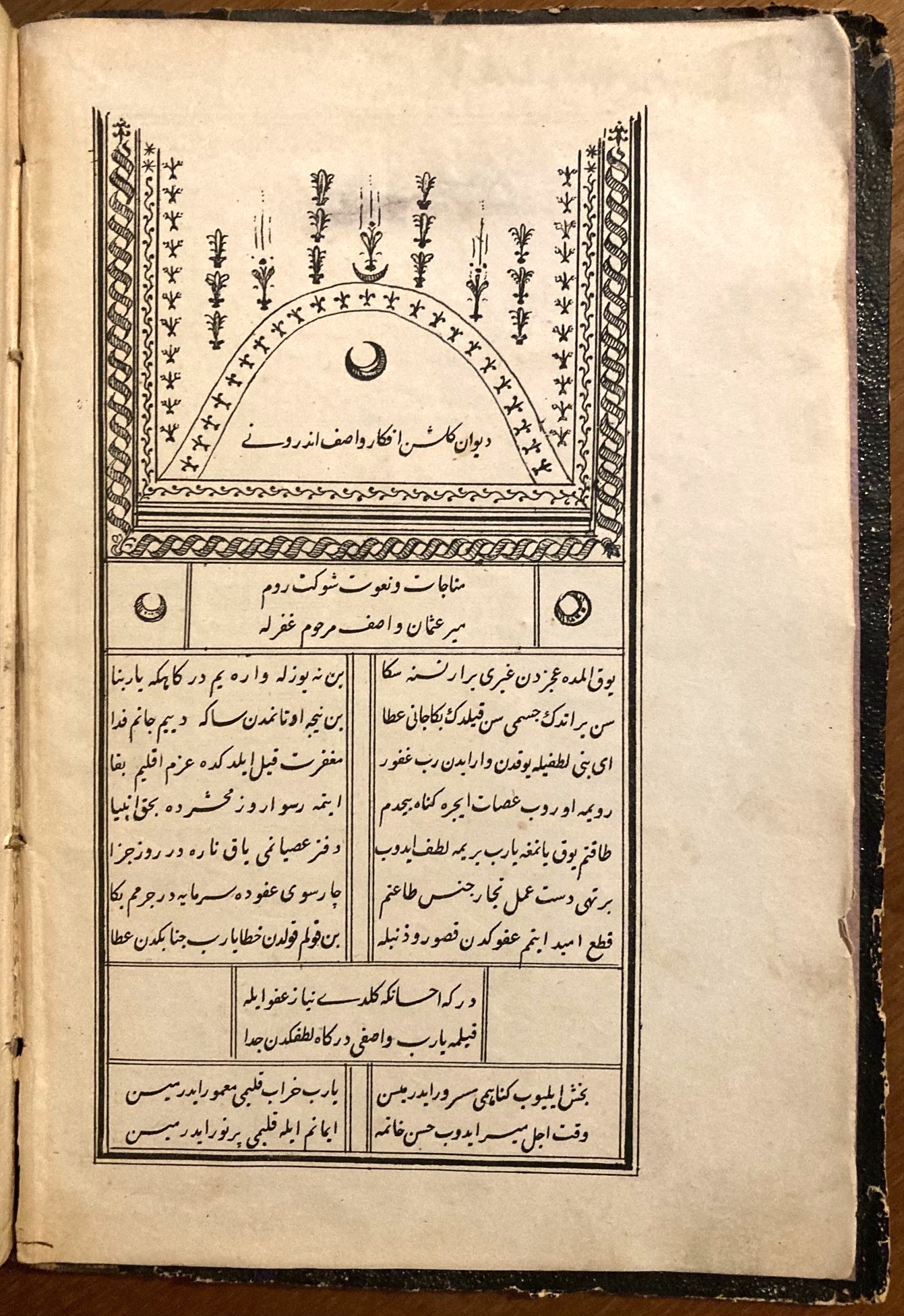
OSMAN VASIF ENDERUNÎ
Divân-ı Gülşen Efkâr-ı Vâsıf-ı Enderunî
Istanbul,1285 [1868]
168+144p.
Özege 4139
Very rare. A copy can be found in the Turkish Grand National Assembly Open Access System: https://acikerisim.tbmm.gov.tr/items/df6ec1ed-3ec8-45e9-94b2-f7b89cba9a2e...
more »



